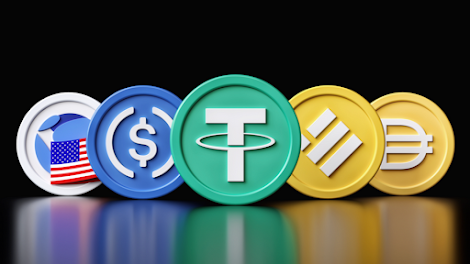Stablecoins are a type of cryptocurrency that are designed to minimize the price volatility that is commonly seen in cryptocurrencies such as Bitcoin or Ethereum.
They achieve this by pegging their value to a stable asset, such as the US dollar, or a basket of assets, through various methods such as collateralization, algorithmic centralization, and other methods.
Stablecoins can be used for a variety of purposes, including as a store of value, a medium of exchange, and as a unit of account.
Some stablecoins are designed for use in specific geographic regions or for certain use cases, such as for remittances or for use in decentralized finance (DeFi) applications.
The most well-known stablecoin is Tether (USDT), which is pegged to the US dollar and is used as a stable alternative to other cryptocurrencies for trading purposes. Other examples of stablecoins include USD Coin (USDC), Dai (DAI), Binance USD (BUSD), and many others.
Here are the most popular stablecoins:
Tether (USDT):
Since its inception in 2014, Tether (USDT) is undoubtedly the dominant market leader when it comes to stablecoins.
Tether converts cash into a digital currency, and pegs its price to the US dollar 1:1.
According to the official website:
USDT is powered by Tether, which is closely related to iFinex, which is the parent company of the popular Bitfinex platform. This fact sparked a lot of controversy surrounding the digital stablecoin.
In 2017, the CFTC sent subpoenas to both Tether and Bitfinex, with possible reasons being a lack of security audits, as well as alleged Bitcoin price manipulation.
Currency (USDC):
(USDC) is a stablecoin launched by the American cryptocurrency exchange “Coinbase” together with the trading desk and OTC - Circle. They are designed to be pegged to the US dollar 1:1.
Fun fact is that Coinbase rewards its clients for holding USDC in their exchange account.
According to Coinbase's official website, each USDC is backed by 1 US dollar, which is held in bank accounts.
The cryptocurrency is powered by the Ethereum blockchain, as a token based on the ERC-20 standard.
This means that users can store it in Ethereum-compatible wallets, such as MyEtherWallet and MyCrypto.
Currency (PAX):
Similar to all other stablecoins, PAX can be transferred instantly, without any regard to time or location.
Like the aforementioned coin, PAX is also pegged 1:1 to the dollar and is based on the Ethereum blockchain and built according to the ERC-20 standard.
Paxos Trust, the issuer of PAX, is also the company that operates the Paxos trading platform, along with custody and protection services for physical and digital assets as a regulated trust.
The company was founded in 2012 and started with the launch of the 'itBit' exchange in Singapore. Later in 2015, Paxos was awarded the New York State Department of Financial Services (NYDFS) credit charter.
Paxos claims that the dollars backing each PAX are held in segregated accounts, insured by the FDIC and housed in US banks.
According to the official website, PAX is listed on more than 100 trading platforms.
Currency (TUSD):
TUSD is another stablecoin based on ERC-20, which is also pegged to the US dollar 1:1.
According to the official website, TUSD is supported by more than 70 trading platforms around the world, including major exchanges.
The TrueUSD issuer has also issued other pegged stablecoins such as:
TrueGBP, TrueAUD, TrueCAD, and TrueHKD.
Currency (DAI):
DAI coin is different from the rest of the stablecoins mentioned above in this list.
While its value is pegged to the US dollar 1:1, the main difference is that it is decentralized.
DAI is not governed or issued by a central authority or as in most cases here, a central corporation. Instead, DAI is governed by a decentralized community of MKR token holders.
These owners control the Maker protocol, the smart contract behind the DAI stablecoin. This comes with a lot of benefits.
This removes the concern that the company controls the supply of the stablecoin.
It is also immutable, censorship-resistant, and completely transparent by design.
Additionally, Maker operates in one of the emerging areas when it comes to cryptocurrency and blockchain-based technology which is the decentralized finance (DeFi) industry.
The main threat to decentralized stablecoins, such as DAI, is smart contract hacking.


Post a Comment